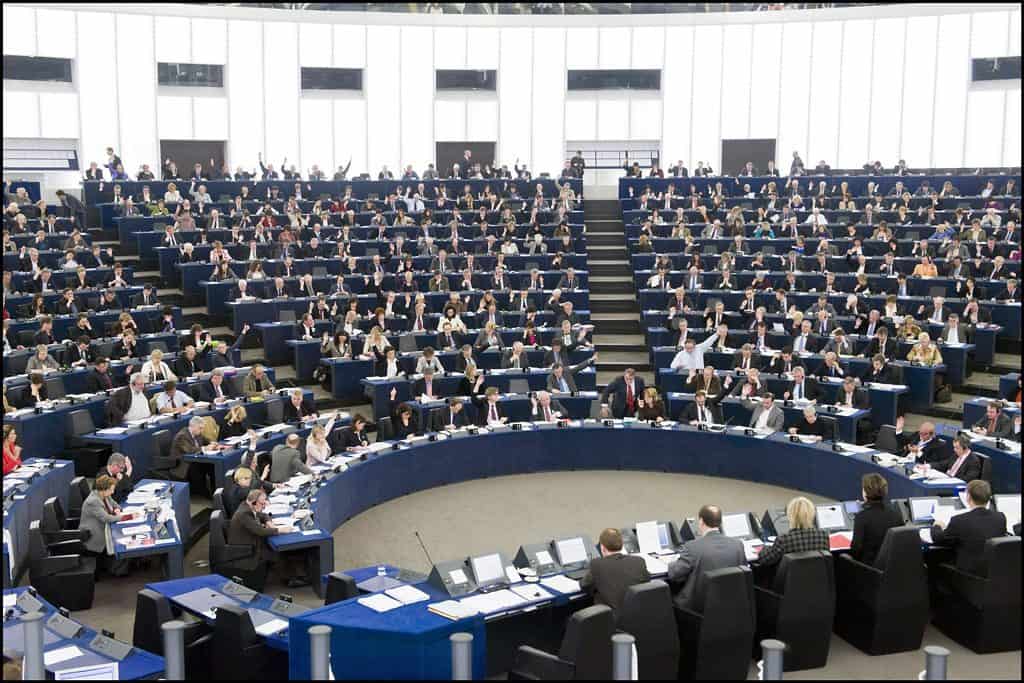
The European Parliament in plenary session in Strasbourg, France. The EP had 751 members before Brexit; now it will have only 705. It also meets in Brussels and Luxembourg.
Trade correspondent L.C. reports:
Hope for a US-EU trade deal received another blow, this time from the European Parliament. On March 14th, a resolution for giving the EU’s executive – the European Commission – a mandate for pursuing the negotiations failed. Opposition to the mandate came largely from the Parliament’s leftist members.
The resolution would have been non-binding, but all 28 EU nations must approve a negotiating mandate. EU member nations had expressed the wish to have Parliament weigh in on the matter.
European Parliament members opposing the resolution were led by France. They expressed concern about approving talks while Section 232 steel and aluminum tariffs remain on European exports to the US.
EU trade ministers will still meet to express approval – or not – for the negotiating mandates, and then EU member-states will vote, this time without any guidance from Parliament. This vote will be binding, and by it the Commission will either receive a mandate to start talks or not.
There were reports this week that Brussels is considering offering a major concession – to include agriculture in the talks – if the US agrees to negotiate access to government procurement at the sub-federal level.
Neither topic was included in the Trump-Juncker agreement to launch talks — and for good reason. The US never includes sub-federal procurement in trade talks because the federal government doesn’t have authority to negotiate for state and municipal governments. Additionally, Buy American provisions are included in many government procurement laws and are politically popular, so the issue isn’t one the US wants to negotiate over.
So the EU offer appears to be less an effort to make a breakthrough on talks than to show Washington that the US has non-negotiable matters just as the EU does on agriculture.
But Congress isn’t about to give in on agriculture. On March 14th, 114 House members of both parties sent a letter to US Trade Representative (USTR) Lighthizer demanding inclusion of agriculture in the talks with the EU. The congressmen said that “an agreement with the EU that does not address trade in agriculture would be, in our eyes, unacceptable” and would “significantly jeopardize… congressional support.” Despite strong trans-Atlantic trade, US farm exports face EU barriers that include “high tariffs, unscientific sanitary and phyto-sanitary measures, and protectionist policies on geographical indications.”
The US push against these barriers is a key reason why Brussels won’t allow talks on farm trade.
It should be noted that the dispute over including agriculture is crucial not only because of its political importance to both sides but because the dispute over its inclusion has raised the issue of bad faith. Brussels and Washington each insist that the other is reneging on what it accepted as part of the original Trump-Juncker deal. Brussels insists that the July Trump-Juncker statement reflected US agreement to leave out agriculture, but the US is now claiming that “agriculture” was only omitted as a last-minute gesture by Trump to please Juncker.
One wonders if President Trump will ever learn that there is a reason for the traditional diplomacy he shuns emphasizing carefully drafted, written agreements which are only at the very last moment signed by leaders. The president’s preference for seat-of-the-pants summit negotiations has so far produced the Trump-Juncker fiasco, a Trump-Kim fiasco in Hanoi, and a Trump-Erdogan fiasco over US troop levels in Syria.
Brexit
The big EU news this week centered about Brexit. The United Kingdom’s Parliament voted down a no-deal exit. But that might happen anyway if Parliament doesn’t approve a version of the Prime Minister’s plan and the EU doesn’t agree to the extension the UK Parliament has requested.
This week the government officially unveiled its tariff-cut / tariff elimination plan as its fallback in the event of no deal. (It was unofficially leaked last week.) So it is a real proposal, though unlikely to be implemented. If it were, though, it would mean that in a post-Brexit, no-EU-deal environment, London would be on a path to forge as many free-trade agreements with other trading partners as it can manage.
President Trump reiterated this week his interest in such a deal, tweeting on March 14th, “My Administration looks forward to negotiating a large scale trade Deal with the UK. The potential is unlimited!”
But US objectives include matters difficult for London, and the UK’s tariff-cut plan doesn’t end protection for key farm products or autos.
Meanwhile, US trade deals with Japan and China remain elusive, and the US-Mexico-Canada Agreement (USMCA) is stalled in Congress. But one sign for optimism: two key trade figures, USTR Lighthizer and Senate Finance Committee chairman Grassley (R-IA), are in agreement that the World Trade Organization (WTO) needs drastic reform rather than US abandonment.

Leave a Reply